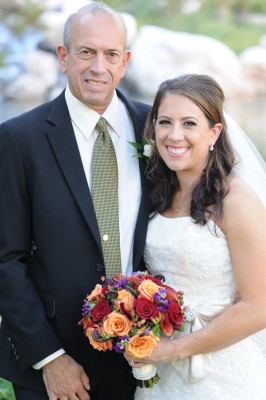 I Never Thought I Would Walk My Daughter Down the Aisle
I Never Thought I Would Walk My Daughter Down the Aisle
Lou Catania
There is no greater reminder that we should cherish moments than nearly dying. A close call with death ensures that we become much more aware of what we have, what we need, and what we might miss. We were extremely aware this past July, that this year marked 20 years since we wallowed in fear, self pity and continual illness. Lou was a married 42-year-old healthy father of 3, with a house, a couple of cars, and a great job. And then, he was sick. It just wasn’t the way it was supposed to be.

We found ourselves faced with having to make very difficult decisions about finances, finding house sitters as we traveled to out of town doctor visits, childcare issues and pet care issues. All of these problems needed answers while our heads swam with thoughts of death and loss, and overwhelming grief and sadness. No one had answers. No one could get an accurate diagnosis. Doctor after doctor remained baffled about why Lou was sick. But we kept trying. My greatest fear was that Lou would die without knowing what killed him.
An answered prayer arrived when we learned that Boston was doing research in Amyloidosis. We knew we had to get there and convince them that they could fix Lou. However, we had not yet gotten a diagnosis. Weeks went by until, finally, we learned that he indeed had amyloidosis. And that is when our relationship with BUMC (now Boston Medical) began. I didn’t think he would survive the flight to Boston from New Jersey. But we made it, and our future was filled with doctor after doctor, followed by teams of students and nurses asking question after question, trying to learn as much as they could about this new and unusual patient. How did it start? How long had this been going on? When did his taste buds change? How much weight had he lost? Did he eat, did he poop, could he sleep?
We could only conclude that all of their questions would somehow end up with a cure, and life would go on as we had planned. But, that didn’t exactly happen. Lou got more and more ill. He lost more and more weight and lost more and more hope that he would ever be better again. No one held on to hope tighter than I did. I think I slept with my hands clenched, thinking that if I held on tight enough that all would be well. Never let go of hope when it is all you have.
Decisions were made, medicines changed and doctors met to talk about the best approach to take. We watched them, wondering if they knew what the hell they were doing. Sometimes the answer was – well, not exactly! Lou was the first person to make it through the stem cell transplant. A man named Michael had died a few weeks before in the middle of the procedure, and that weighed heavy on our minds. But slowly, things fell into place. Blood counts changed, proteins changed, medications changed and Lou started to improve. We smiled with cautious optimism. We hoped, blended in with a lot of prayer.
As Lou slowly improved, talks began about what to do next. The doctors thought the stem cell transplant was just a stepping stone to a bone marrow transplant. Lou asked what the risks of the BMT were, and his doctor said, “Well, it could kill ya,” so we decided to take a “wait and see” approach to the BMT.
Lou became stronger and eventually went home and back to work. We communicated with more and more people who had heard about Boston, the work they were doing, and the successful stories that followed ours. I can tell you that nothing puts a smile on a team of BU amyloid team doctors faces faster than when Lou walks down the hall. And, there are always tears. Big tears of joy and happiness: some are about the times that could have been missed because our daughter just got married. It was with great pride that we both walked her down the aisle and threw one of the most fun weddings that anyone could imagine. We knew the whole time that we had a team of doctors from BU to thank for making it possible.
And life goes on, and on and on and on…
Extensive work and research have greatly improved the field of Amyloidosis. We hope for the best for all the patients that follow us. And we are so thankful that Lou didn’t miss the wedding of our daughter, Dr. Sondra Catania, to Dr. Ricky Feher.
–Linda Catania
Update: June, 2024
Louis Anthony Catania, a 42-year-old Amyloid patient who was the first to survive Amyloid with the use of an STC and high-dose chemotherapy in 1994, is still alive 30 years later. He is 72, still works, uses oxygen as needed, and still complains all the time about nothing. And that’s how we know he’s well. (It’s apparently an Italian thing) Although he has slowed the pace a bit, and can’t exactly jog up the stairs, he’s generally well to the surprise of many. We remain eternally grateful to all the doctors involved in Lou’s care, and we send thank you notes to our doctors on Lou’s birthday, and on our anniversary. I’m still holding on to hope.
-Linda Catania
